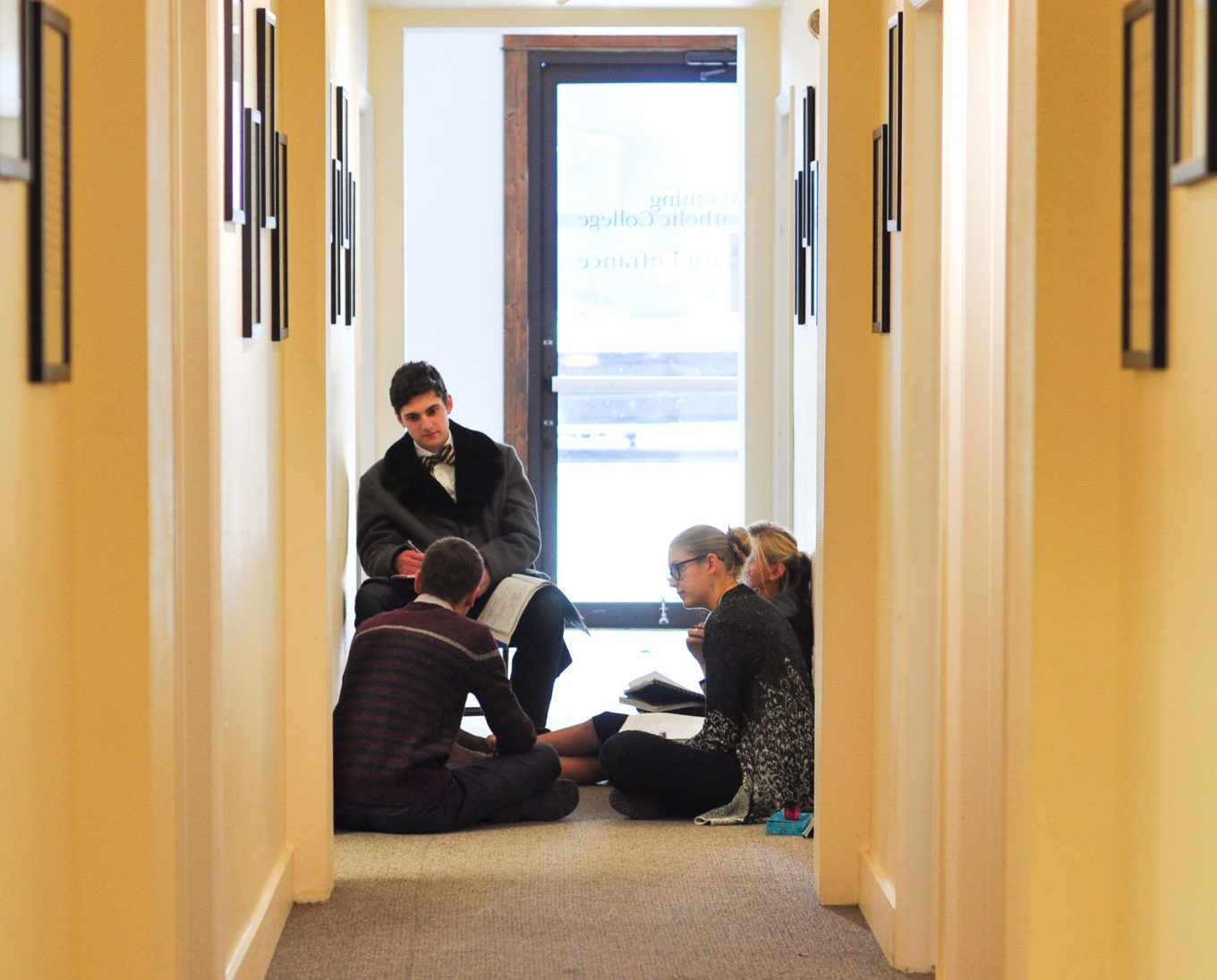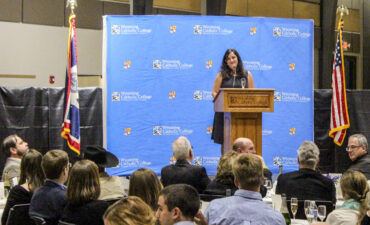Ten Years In, College’s Technology Policy Looks More Prescient Than Reactionary
Ban cell phones!
In the earliest years of Wyoming Catholic College, the rule that generated the most conversation—even, at times, controversy—was our technology policy, especially the prohibition of cell phones. From the outset, the ban was less a statement about the value of mobile devices (or of the Internet) than it was a reflection of our founders’ understanding of the process of education and the nature of human flourishing. It was an intentional effort to encourage and shape a community committed to the pursuit of the truth. We were never afraid of (or ideologically opposed to) the ever-quickening advances in technology, but we were concerned about the impact such technology, unexamined, could have on a community such as ours.
Now, some ten years later, many recent scientific studies and high-profile articles from a range of prominent newspapers and periodicals suggest that our decision to limit our students’ access to cell phones wasn’t backward-looking or luddite: it was cutting-edge.
In an article published in the “Saturday Essay” section of The Wall Street Journal’s October 6th edition, Nicholas Carr highlights several studies on the many ways our smartphones can damage our capacity for attention, and even more importantly, our social relationships. The piece (now hidden, ironically, behind a paywall) is called “How Smartphones Hijack Our Minds,” and its author suggests that “as the brain grows dependent on phone technology, the intellect weakens.” Carr urges his readers to take stock of what they’re holding: “Imagine combining a mailbox, a newspaper, a TV, a radio, a photo album, a public library and a boisterous party attended by everyone you know, and then compressing them all into a single, small, radiant object. That is what a smartphone represents to us. No wonder we can’t take our minds off it.”

But is such a powerful and ever-present object an unmitigated good? Or does all the knowledge and convenience come at a cost? In “For better learning in college lectures, lay down the laptop and pick up a pen,” an August article from The Brookings Institute, Susan Dynarski recounts a recent study undertaken at the United States Military Academy (USMA). Researchers examined a trio of classroom settings—one where electronics were allowed, one where they were banned, and one where tablet computers were allowed, but only if laid flat on students’ desks where professors could observe their use.
“At the end of the semester,” she reports, “students in the classrooms where electronics were allowed had performed substantially worse, with scores 0.2 standard deviations below those of the sections where electronics were banned. There was no discernible difference between sections where tablets were allowed but restricted and those where electronics were unrestricted.” Like Nicholas Carr’s article, Dr. Dynarski’s reflections are encouraging us to examine whether the impact on our ability to process and understand information is worth the price of convenience.
The September issue of The Atlantic features a similarly-themed article, “Have Smartphones Destroyed a Generation?” in which Jean Twenge, a professor of psychology at San Diego State University, adapts the argument from her forthcoming book, iGen: Why Today’s Super-Connected Kids Are Growing Up Less Rebellious, More Tolerant, Less Happy—and Completely Unprepared for Adulthood—and What That Means for the Rest of Us.
Prof. Twenge goes beyond Carr’s and Dynarski’s concerns about the impact our devices have on the way we process and store information, focusing instead on the way they influence our social interactions. “One of the ironies of iGen life,” she recounts, “is that despite spending far more time under the same roof as their parents, today’s teens can hardly be said to be closer to their mothers and fathers than their predecessors were. …The number of teens who get together with their friends nearly every day dropped by more than 40 percent from 2000 to 2015; the decline has been especially steep recently.” In other words, our devices leave us much more “connected” but far less present.
 As president of Wyoming Catholic College, Dr. Glenn Arbery is often asked to explain the Technology Policy. In a recent edition of his weekly Bulletin email blast, “Smartest Students in America?”, he says that many members of his audience “quickly see the logic of the ban on cell phones, and those who visit Lander and meet our students see it even more forcefully. Are they hopelessly caught in the eddies as history rushes past them into iPhone X? Quite the opposite. They talk to each other without electronic distraction, they look adults in the eye, they laugh often and easily, they exercise wit without reflexive cynicism, they love dancing and singing and playing instruments; they love the classics and the outdoors, and they are distinct individuals in the image and likeness of God, not conformists of an individualism predicated upon what Robert George calls a ‘neo-gnostic’ gender-neutral selfhood.”
As president of Wyoming Catholic College, Dr. Glenn Arbery is often asked to explain the Technology Policy. In a recent edition of his weekly Bulletin email blast, “Smartest Students in America?”, he says that many members of his audience “quickly see the logic of the ban on cell phones, and those who visit Lander and meet our students see it even more forcefully. Are they hopelessly caught in the eddies as history rushes past them into iPhone X? Quite the opposite. They talk to each other without electronic distraction, they look adults in the eye, they laugh often and easily, they exercise wit without reflexive cynicism, they love dancing and singing and playing instruments; they love the classics and the outdoors, and they are distinct individuals in the image and likeness of God, not conformists of an individualism predicated upon what Robert George calls a ‘neo-gnostic’ gender-neutral selfhood.”
“The purpose of the technology policy was and is to try to ensure that students have the experiential knowledge and the freedom from distraction appropriate for study,” he continues. “Did the founders fully understand how cutting-edge this policy would seem a decade on? How revolutionary and hale it would prove to be? I doubt it, but we can thank them for its obvious good fruit.”
In a recent conversation for an upcoming edition of the Wyoming Catholic College Magazine, Dr. Jason Baxter and Dr. Jeremy Holmes discuss their ongoing relationship with the technology policy, particularly the way they have come to appreciate it more fully in the years since they first arrived in Lander. They see its impact both on their students’ abilities in the classroom and on their abilities to interact with one another.
“Technology is a way of extending our powers into the world,” says Dr. Holmes. “What we don’t notice, however, is that when we extend ourselves through our tools, our tools are simultaneously extending into us.” He continues: “When you use data-storers to extend your ability to retain and access information, what it means to remember is being redefined….It’s only when you pull the computer out of yourself and remember that you’re a human being that you’re able to say, ’Remembering this stuff is a wholly different act than having access to the data, and that difference is important.’”

Carr’s WSJ piece underscores this danger, as well, when he says that “as the pioneering psychologist and philosopher William James said in an 1892 lecture, ‘the art of remembering is the art of thinking.’ Only by encoding information in our biological memory can we weave the rich intellectual associations that form the essence of personal knowledge and give rise to critical and conceptual thinking.”
Dr. Baxter, who has published several recent articles on technology (especially as it relates to education), is particularly struck by the way removing oneself from the power of the cell phone (at least temporarily) transforms the way one relates to the world. “When I started writing on technology,” he said, “I realized that there is a secret and beautiful unity between the College’s outdoor programs, its technology policy, and our curriculum. The technology policy is the substrate of authenticity—this connecting to ‘The Real’—and our students are being immersed in a situation of authentic knowledge. They are gaining intellectual experiences in three dimensions, with affections, tastes, and flavors, and with a certain amount of arduous work. As they do so, we are creating for them a situation that helps to encourage their potential for deep knowledge.”
That potential for “deep knowledge” lies at the heart of another recent piece from the Harvard Business Review, “Liberal Arts in the Data Age,” a review of Scott Hartley’s book The Fuzzy and the Techie. “What matters now is not the skills you have but how you think,” says its author J.M. Olejarz, assistant editor of the Review. “Can you ask the right questions? Do you know what problem you’re trying to solve in the first place? Hartley argues for a true ‘liberal arts’ education—one that includes both hard sciences and ‘softer’ subjects. A well-rounded learning experience, he says, opens people up to new opportunities and helps them develop products that respond to real human needs.”
But perhaps “developing new products” isn’t the gauge, since it puts us squarely back in the realm of technological understanding. What we’re after is a sense of the gift of genuine presence—real human beings finding the divine image in each other because they are profoundly conscious of the person standing before them in the present moment. That presence is the essential element for responding to real human needs, and it’s the key to Wyoming Catholic College’s cutting-edge technology policy.






